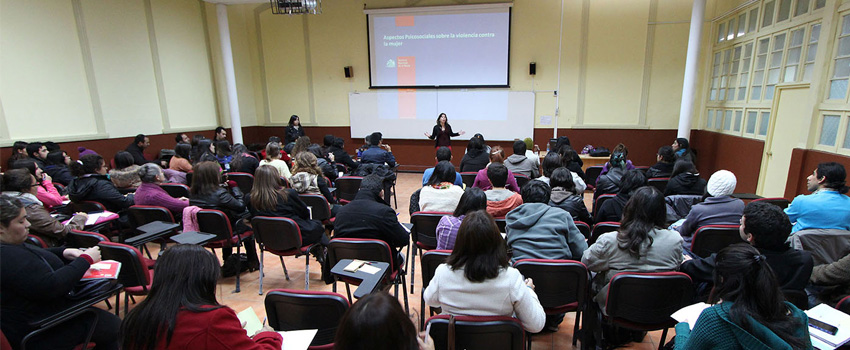
Students from different ULS majors, university officials and representatives of the general community actively participate in the initiative.
The 2014 Training Course ''Intervention in Couple Violence with a Gender Approach'', taught by the Liwen Women's Center, has had a massive call, as part of the agreement signed in 2012 between the University of La Serena and the National Service of Women, SERNAM.
The course workshops began on June 4 at the Isabel Bongard Campus of the ULS and will bring together their participants for 7 days, always on Wednesdays, to address this topic from the most varied aspects: general aspects, psychosocial aspects, theoretical models , Men's Center intervention model, first reception, Domestic Violence Law 20.066 and workplace and sexual harassment.
The course, which is free and will be certified, has the attendance of about 80 people, among whom are students from different careers at the University of La Serena, officials of the institution and representatives of the general community. In addition, it is supported by the ULS Officials Association.
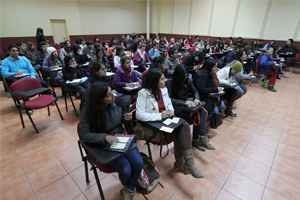 As Keyla Marín, coordinator of the Liwen Center, explains, the objective of the course is to ''install the capacity to detect violence for future professionals and the professionals who are accompanying us on these days. Install capabilities to detect violence but also to become aware of how we are part of modifying this culture, which is where we stand to look at violence through language, doing internal and at the same time external work.''
As Keyla Marín, coordinator of the Liwen Center, explains, the objective of the course is to ''install the capacity to detect violence for future professionals and the professionals who are accompanying us on these days. Install capabilities to detect violence but also to become aware of how we are part of modifying this culture, which is where we stand to look at violence through language, doing internal and at the same time external work.''
Regarding the expectations with the participants, Marín points out that he hopes that they will be "the ones who take the topic to other spaces, with all the people they interact with, that in some way they will be the new entities that raise awareness of the topic in all spaces of dialogue." , interpersonal relationships that are established outside the University and the workplace.
Keyla Marín was also the presenter of the first workshop. In this regard, the good number of men and women participating in this training stands out, learning about the topic through stories and learning "that each and every one of us, from the State on down," can be "relevant and significant actors here." ahead of their lives and those of those who work with them on the issue of violence against women.''
Meanwhile, the coordinator of the agreement at the ULS, the academic of the Department of Education, Georgina García, highlights that this alliance between the University of La Serena and SERNAM ''is very important to fulfill our work as a state and regional University, since In addition to training professionals and generating knowledge, our actions must promote changes for improvements both economically, politically, culturally and socially in the localities in which we are located. Furthermore, State organizations must strengthen their ties to exchange knowledge, resources and experiences because they share an objective, the good of society as a whole, a task that is far removed from the desire to profit from knowledge.''
The academic added that ''this alliance corresponds to the continuity of a task that other academics such as Marta Vitar, María Teresa Juliá and Erika Zúñiga, among others, began years ago, who promoted a Gender Study Program. In this context of the agreement, work is being done with the Central Library on the creation of a Manual on Women's Rights that will be freely accessible."
Regarding the fact that 'students can access training on the topic of gender violence, it not only benefits them in their professional training since in the very near future they will have to promote respectful human relations and make decisions regarding their staff in charge, but it will also have an impact on their personal life since they will have tools to detect these behaviors and look for relevant solutions. One of my students recently told me that the boyfriend of one of her friends asked her for information about where they were going to dance and what clothes she was going to wear, and she told him: ''be careful, these behaviors are very controlling. ''This is a sample of everyday situations of symbolic violence that could end in more serious behavior if they are not stopped in time,'' García highlights.
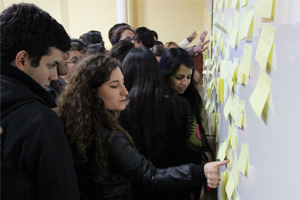 The Liwen Center psychologist, Karina Meza, was in charge of teaching the second workshop of the course. The professional explained that times are changing and, as we become aware of our rights, ''this issue that generates so much pain, returns to the discussion. Currently, the issue of violence against women is more criticized and less permitted." She recalled that 17 femicides have occurred in Chile so far this year and mentioned that 275 women are treated in La Serena alone for gender violence.
The Liwen Center psychologist, Karina Meza, was in charge of teaching the second workshop of the course. The professional explained that times are changing and, as we become aware of our rights, ''this issue that generates so much pain, returns to the discussion. Currently, the issue of violence against women is more criticized and less permitted." She recalled that 17 femicides have occurred in Chile so far this year and mentioned that 275 women are treated in La Serena alone for gender violence.
Meza began his workshop by carrying out practical work to analyze the learned (gender) and natural (sex) characteristics of men and women, as well as how social networks are formed and people's behaviors are expected. She specified that ethical, political, legal and cultural components provide the social and historical context in which violence occurs and the interests that support it, highlighting domination among these elements.
Meanwhile, Paula Álvarez, in charge of the Violence Against Women Prevention Unit, Chile Acoge SERNAM Program in the Coquimbo Region, appreciated that these types of initiatives are already part of daily life in this alliance between the ULS and the National Health Service. Women. ''Year after year, we see that more people are interested in taking this course. "I understand that they are from different careers, so that is interesting, that from the training of the different professionals they have incorporated different concepts of gender and notions of violence against women, because ultimately it is present in all spaces of our society," she said. .
In the same way, he maintained that it is expected that the participants can generate knowledge in their careers and "be replicators in the denaturalization of the concept of violence with their classmates, for example, and in their professional practice we hope that when they encounter the thematic, with a particular case, depending on their careers, know how to demystify this harshest discrimination that women experience and, on the other hand, provide adequate information, that there are programs that work and address the problem to know how to guide, in case of that you meet victims and that there are spaces for promotion in their community.''
It is important to highlight that this course has been carried out on previous occasions within the framework of the ULS-SERNAM agreement, with two versions in 2013 and could be replicated in the second half of this year.
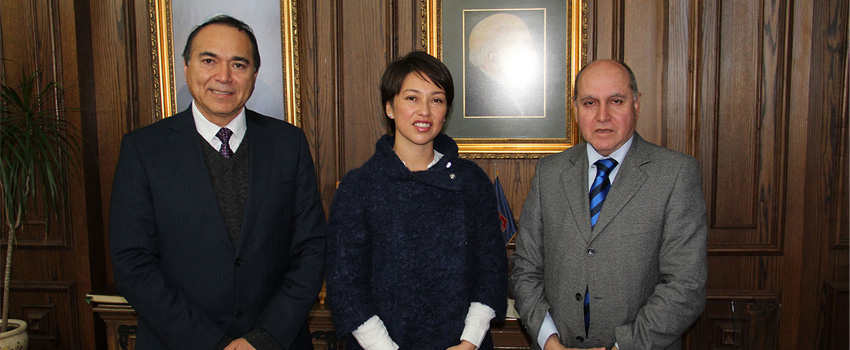
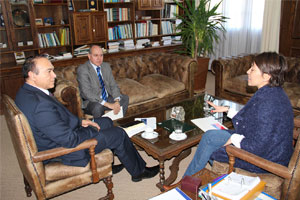 During this meeting, held in the offices of the ULS Headquarters, the Labor Seremi extended the invitation to the university institution to participate in this program whose general objective is to strengthen the quality training of union leaders, through of training in theoretical and practical aspects that allow them to acquire or perfect the skills aimed at better developing their union work.
During this meeting, held in the offices of the ULS Headquarters, the Labor Seremi extended the invitation to the university institution to participate in this program whose general objective is to strengthen the quality training of union leaders, through of training in theoretical and practical aspects that allow them to acquire or perfect the skills aimed at better developing their union work.
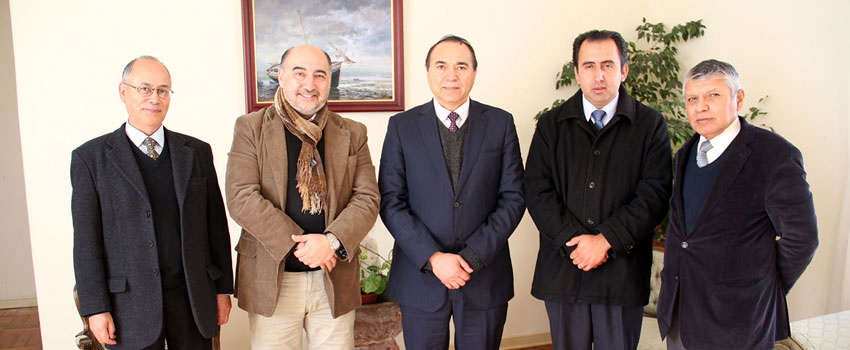
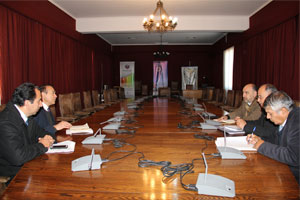 Meanwhile, the director of Institutional Studies and Planning of the ULS, Dr. © César Espíndola, explained that “in the field of Teaching, this project aims to provide a specific seal of training for our students, so that they can respond to the needs current and future development of the regional and national territory.”
Meanwhile, the director of Institutional Studies and Planning of the ULS, Dr. © César Espíndola, explained that “in the field of Teaching, this project aims to provide a specific seal of training for our students, so that they can respond to the needs current and future development of the regional and national territory.”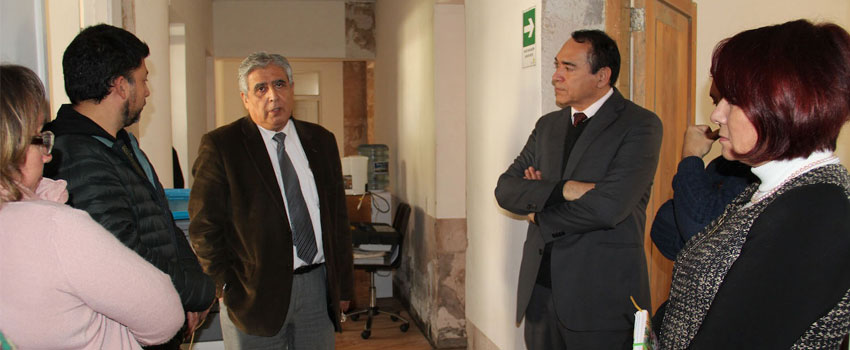

 As Keyla Marín, coordinator of the Liwen Center, explains, the objective of the course is to ''install the capacity to detect violence for future professionals and the professionals who are accompanying us on these days. Install capabilities to detect violence but also to become aware of how we are part of modifying this culture, which is where we stand to look at violence through language, doing internal and at the same time external work.''
As Keyla Marín, coordinator of the Liwen Center, explains, the objective of the course is to ''install the capacity to detect violence for future professionals and the professionals who are accompanying us on these days. Install capabilities to detect violence but also to become aware of how we are part of modifying this culture, which is where we stand to look at violence through language, doing internal and at the same time external work.'' The Liwen Center psychologist, Karina Meza, was in charge of teaching the second workshop of the course. The professional explained that times are changing and, as we become aware of our rights, ''this issue that generates so much pain, returns to the discussion. Currently, the issue of violence against women is more criticized and less permitted." She recalled that 17 femicides have occurred in Chile so far this year and mentioned that 275 women are treated in La Serena alone for gender violence.
The Liwen Center psychologist, Karina Meza, was in charge of teaching the second workshop of the course. The professional explained that times are changing and, as we become aware of our rights, ''this issue that generates so much pain, returns to the discussion. Currently, the issue of violence against women is more criticized and less permitted." She recalled that 17 femicides have occurred in Chile so far this year and mentioned that 275 women are treated in La Serena alone for gender violence. 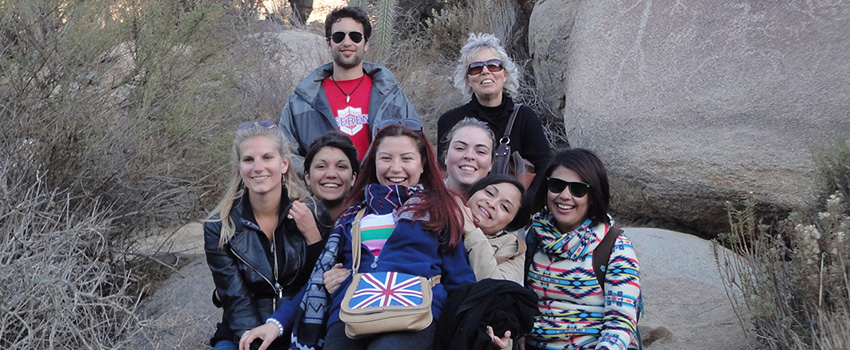
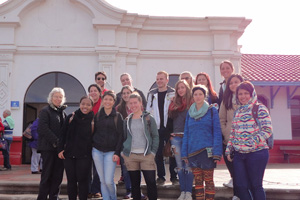 But, that was not all, the young people from countries as diverse as Germany, Colombia, Denmark, Mexico and Romania, took advantage of this trip for a photo session in the Plaza de Armas of Ovalle, accompanied by a tender dog, who transformed in part of the group.
But, that was not all, the young people from countries as diverse as Germany, Colombia, Denmark, Mexico and Romania, took advantage of this trip for a photo session in the Plaza de Armas of Ovalle, accompanied by a tender dog, who transformed in part of the group.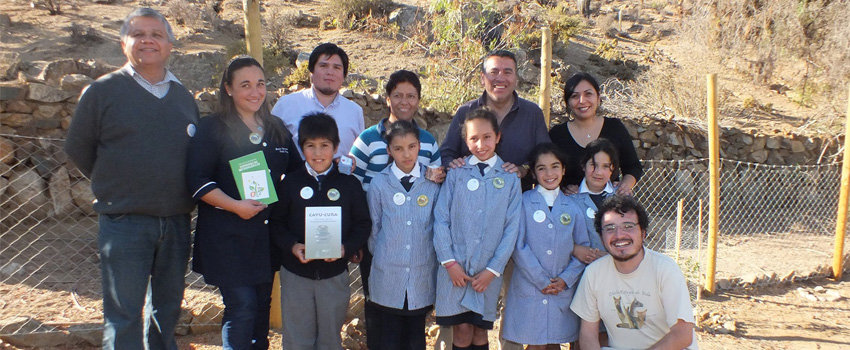
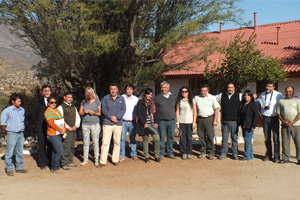 ''The usual thing is that it is thought that the chinchilla is in danger of extinction due to illegal hunting, which happened in the past, but that is no longer a threat in the strict sense; Now the threats are, basically, the fragmentation and loss of habitat due to human activities, whether agricultural, mining or micro-garbage, among others, which have not been considered,'' explained ULS researcher Carlos Zuleta, who He stated that there are multiple threat factors that could cause problems in its conservation and that the community is unaware of.
''The usual thing is that it is thought that the chinchilla is in danger of extinction due to illegal hunting, which happened in the past, but that is no longer a threat in the strict sense; Now the threats are, basically, the fragmentation and loss of habitat due to human activities, whether agricultural, mining or micro-garbage, among others, which have not been considered,'' explained ULS researcher Carlos Zuleta, who He stated that there are multiple threat factors that could cause problems in its conservation and that the community is unaware of.